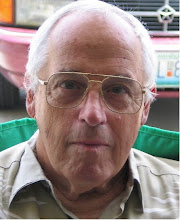What If We Were Heroes?
Fiction is often a what-if speculation. We saw a movie last night with James Earl Jones playing the part of a wealthy black widower whose wife asked him on her death bed to open a reading room in the old ghetto where he grew up. What if someone really did that? What would happen? Would the people in that neighborhood really like it? Would lives be changed? The author of this story was playing a what-if game with those who read the story or watched the movie.
Some say that watching television is a waste of time. Perhaps some of it is, but a great deal of it is a what-if game that makes us think. Even the news plays a what-if game with us. What if we had a hurricane and flood like the people in New Orleans had? What if all those terrible things we see happening to others happened to us? Maybe this explains something I have been wondering about for a very long time. Why do people want to watch the bad news, but aren’t particularly interested in the good news? The bad news is a better what-if game. A great deal of fiction writings are stories of good versus evil. Even J.K. Rowling, a very creative writer who has made over a billion dollars with her Harry Potter books, says that her stories are about good and evil. Doesn’t every kid who reads the stories put themselves in the place of Harry or his friends who fight evil with their magic? Wouldn’t you like to have the power to fight evil and become a hero? Wouldn’t you like to be able to fight like Chuck Norris or be smart enough to solve crimes in a C.S.I. laboratory? Isn’t the ability to suppress evil one of our most basic human wants? Of course each of us has our own way of suppressing evil. Some teach; some preach; some write what-if stories; some are lawyers; some are police; some are fire fighters. There are many heroes among us. Not all persons who are fighting evil are heroes; some do more harm than good, but most are genuine heroes.
Some say that watching television is a waste of time. Perhaps some of it is, but a great deal of it is a what-if game that makes us think. Even the news plays a what-if game with us. What if we had a hurricane and flood like the people in New Orleans had? What if all those terrible things we see happening to others happened to us? Maybe this explains something I have been wondering about for a very long time. Why do people want to watch the bad news, but aren’t particularly interested in the good news? The bad news is a better what-if game. A great deal of fiction writings are stories of good versus evil. Even J.K. Rowling, a very creative writer who has made over a billion dollars with her Harry Potter books, says that her stories are about good and evil. Doesn’t every kid who reads the stories put themselves in the place of Harry or his friends who fight evil with their magic? Wouldn’t you like to have the power to fight evil and become a hero? Wouldn’t you like to be able to fight like Chuck Norris or be smart enough to solve crimes in a C.S.I. laboratory? Isn’t the ability to suppress evil one of our most basic human wants? Of course each of us has our own way of suppressing evil. Some teach; some preach; some write what-if stories; some are lawyers; some are police; some are fire fighters. There are many heroes among us. Not all persons who are fighting evil are heroes; some do more harm than good, but most are genuine heroes.

